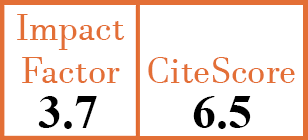Full Papers
Biological DMARD efficacy in psoriatic arthritis: a systematic literature review and meta-analysis on articular, enthesitis, dactylitis, skin and functional outcomes
N. Simons1, Y. Degboé2, T. Barnetche3, A. Cantagrel4, A. Ruyssen-Witrand5, A. Constantin6
- Department of Rheumatology, Purpan Hospital, Toulouse III University, Toulouse, France. simons.n@chu-toulouse.fr
- Department of Rheumatology, Purpan Hospital, Toulouse III University, Toulouse, France.
- Department of Rheumatology, FHU ACRONIM, Pellegrin Hospital, Bordeaux University, Bordeaux, France.
- Department of Rheumatology, Purpan Hospital, Toulouse III University, Toulouse, France.
- Department of Rheumatology, Purpan Hospital, Toulouse III University, Toulouse, France.
- Department of Rheumatology, Purpan Hospital, Toulouse III University, Toulouse, France.
CER12429
2020 Vol.38, N°3
PI 0508, PF 0515
Full Papers
Free to view
(click on article PDF icon to read the article)
PMID: 31969228 [PubMed]
Received: 16/05/2019
Accepted : 15/07/2019
In Press: 20/01/2020
Published: 26/05/2020
Abstract
OBJECTIVES:
There is no hierarchy in the use of biotherapies (bDMARDs) in psoriatic arthritis (PsA) and no published head-to-head comparative studies. Our purpose is to evaluate the respective efficacy of TNF inhibitors, IL12/23 inhibitors (ustekinumab), IL17 inhibitors (secukinumab, ixekizumab) and CTLA4Ig (abatacept) on articular, enthesitis, dactylitis, skin and functional outcomes in PsA.
METHODS:
Randomised controlled trials assessing bDMARDs in PsA were selected through the MedLine, Cochrane and Embase databases. ACR20/50/70 and PASI75/90 response rates, enthesitis and dactylitis reduction rates and HAQ-DI mean reductions were collected. Pooled meta-analyses were performed to assess relative risks (RR) with their 95% confidence interval (95%CI) for each class of bDMARDs in comparison with placebo.
RESULTS:
17 RCTs were analysed. Compared to placebo, all bDMARDs showed higher ACR20 response rates, with RRs ranging from 1.77 (1.31, 2.39) to 3.21 (2.52, 4.08), and a greater HAQ-DI mean reduction. TNF inhibitors, secukinumab and IL17 inhibitors showed higher ACR50/70 and PASI75/90 response rates. TNF inhibitors, secukinumab and IL17 inhibitors showed higher enthesitis resolution rates and only TNF inhibitors and IL17 inhibitors showed higher dactylitis resolution rates, with RRs ranging from 1.41 (1.02, 1.95) to 2.31 (1.60, 3.34) and from 2.07 (1.38, 3.12) to 2.65 (1.79, 3.94), respectively.
CONCLUSIONS:
All bDMARDs showed higher ACR20 response rates and better HAQ-DI mean reduction compared to placebo. This meta-analysis highlights the variability of bDMARD efficacy on ACR50/70, PASI75/90 and enthesitis or dactylitis response rates. Head-to-head studies are needed to draw definitive conclusions on potential efficacy-related differences between bDMARDs in PsA.



